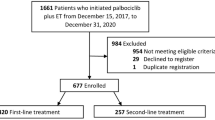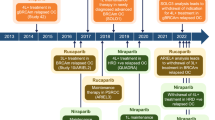Abstract
Angiogenesis is an important driver of growth and metastasis. Preclinical studies in epithelial ovarian cancer have shown the association between increased angiogenesis and poor prognosis. More than 10 years ago, single-agent bevacizumab (BV) was found to have activity in advanced ovarian cancer. Since then multiple randomized clinical trials have shown improvements in clinically relevant outcomes, especially, progression-free survival (PFS). The most important evidence supporting adjuvant use of BV came from the GOG 218 and ICON 7 trials. Both trials showed improvements in PFS with a higher magnitude of benefit for those with high-risk disease, i.e., Stage IV, inoperable and suboptimally debulked Stage III disease. Use of BV was also associated with an improvement in overall survival in these high-risk subgroups. The EMEA has recommended use of BV in the adjuvant setting, and the ESMO has endorsed its use in high-risk subgroups. Though there is a small detriment in the quality of life with addition of BV, this is not clinically significant. Based on the available efficacy data and approval by regulatory bodies, BV is recommended for adjuvant treatment of advanced epithelial ovarian cancer. The search for a predictive marker has remained elusive. The data for antiangiogenic agents other than BV are scant. Many more agents are in early stages of clinical development.
Similar content being viewed by others
References
Mesiano S, Ferrara N, Jaffe RB. Role of vascular endothelial growth factor in ovarian cancer: inhibition of ascites formation by immunoneutralization. Am J Pathol. 1998;153:1249–56.
Gasparini G, Bonoldi E, Viale G, et al. Prognostic and predictive value of tumour angiogenesis in ovarian carcinomas. Int J Cancer. 1996;69:205–11.
Paley PJ, Staskus KA, Gebhard K, et al. Vascular endothelial growth factor expression in early stage ovarian carcinoma. Cancer. 1997;80:98–106.
Monk BJ, Han E, Josephs-Cowan CA, et al. Salvage bevacizumab (rhuMAB VEGF)-based therapy after multiple prior cytotoxic regimens in advanced refractory epithelial ovarian cancer. Gynecol Oncol. 2006;102:140–4.
Burger RA, Sill MW, Monk BJ, et al. Phase II trial of bevacizumab in persistent or recurrent epithelial ovarian cancer or primary peritoneal cancer: a Gynecologic Oncology Group Study. J Clin Oncol. 2007;25:5165–71.
Aghajanian C, Blank SV, Goff BA, et al. OCEANS: a randomized, double-blind, placebo-controlled phase III trial of chemotherapy with or without bevacizumab in patients with platinum-sensitive recurrent epithelial ovarian, primary peritoneal, or fallopian tube cancer. J Clin Oncol. 2012;30:2039–45.
Pujade-Lauraine E, Hilpert F, Weber B, et al. AURELIA: a randomized phase III trial evaluating bevacizumab (BEV) plus chemotherapy (CT) for platinum (PT)-resistant recurrent ovarian cancer (OC). J Clin Oncol. 2012;30(suppl):abstr LBA5002.
Coleman RL, Brady MF, Herzog TJ, et al.: A phase III randomized controlled clinical trial of carboplatin and paclitaxel alone or in combination with bevacizumab followed by bevacizumab and secondary cytoreductive surgery in platinum-sensitive, recurrent ovarian, peritoneal primary and fallopian tube cancer (Gynecologic Oncology Group 213) (abstract 3). Society of gynecologic oncology annual meeting women’s cancer, Chicago; 2015.
Burger RA, Brady MF, Bookman MA, et al. Incorporation of bevacizumab in the primary treatment of ovarian cancer. N Engl J Med. 2011;365(26):2473–83.
Oza AM, Cook AD, Psterer J, et al. Standard chemotherapy with or without bevacizumab for women with newly diagnosed ovarian cancer (ICON7): overall survival results of a phase 3 randomised trial. Lancet Oncol. 2015;16(8):928–36.
Randall LM, Burger RA, Nguyen H et al. Outcome differences in patients with stage IV epithelial ovarian, primary peritoneal and fallopian tube cancers treated with and without bevacizumab. In: 44th annual meeting of the society of gynecologic oncology, Los Angeles, CA; 2013.
Chan JK, Brady MF, Penson RT, et al. Weekly vs. every-3-week paclitaxel and carboplatin for ovarian cancer. N Engl J Med. 2016;374(8):738–48.
Gyawali B, Prasad V. Same data. Different interpretations. J Clin Oncol. 2016;. doi:10.1200/JCO.2016.68.2021.
Ye O, Chen HL. Bevacizumab in the treatment of ovarian cancer: meta analysis of four randomized controlled phase III trials. Arch Gynecol Obstet. 2013;288:655–66.
Zhou M, Yu P, Qu X, Liu Y, Zhang J. Phase III trials of standard chemotherapy with or without Bevacizumab for ovarian cancer. A meta analysis. PLoS ONE. 2013;8:e81858.
Li J, Zhou L, Chen X, Ba Y. Addition of bevacizumab to chemotherapy in patients with ovarian cancer. A systematic meta analysis. Clin Transl Oncol. 2015;9:673–83.
Ledermann JA, Raja FA, Fotopoulou C, et al. Newly diagnosed and relapsed epithelial ovarian carcinoma: ESMO Clinical Practice Guidelines for diagnosis, treatment and follow-up. Ann Oncol. 2013;24(Suppl 6):vi24–32.
NHS England: Cancer Drug Fund decision summaries. https://www.england.nhs.uk/ourwork/cancer/cdf/cdf-drug-sum/. Last accessed 20 Nov 2015.
Karam, et al. Fifth ovarian cancer consensus conference of the gynecologic cancer intergroup: first line interventions. Ann Oncol. 2017;28:711–7.
Monk BJ, Huang HQ, Burger RA, et al. Patient reported outcomes of a randomized, placebo-controlled trial of bevacizumab in the front-line treatment of ovarian cancer: a gynecologic oncology group study. Gynecol Oncol. 2013;128(3):573–8.
Stark D, Nankivell M, Pujade-Lauraine E, et al. Standard chemotherapy with or without bevacizumab in advanced ovarian cancer: quality-of-life outcomes from the international collaboration on ovarian neoplasms (ICON7) phase 3 randomised trial. Lancet Oncol. 2013;14(3):236–43.
Bois AD, Kristensen G, Ray-Coquard I, et al., AGO Study Group led Gynecologic Cancer Intergroup (GCIG)/European Network of Gynaecologic Oncology Trials Groups (ENGOT) Intergroup Consortium: Standard first-line chemotherapy with or without nintedanib for advanced ovarian cancer (AGO-OVAR 12): a randomised, double-blind, placebo-controlled phase 3 trial. Lancet Oncol. 2015 (epub ahead of print).
du Bois A, Floquet A, Kim JW, Rau J, et al. Incorporation of pazopanib in maintenance therapy of ovarian cancer. Clin Oncol. 2014;32:3374–82.
Author information
Authors and Affiliations
Corresponding author
Ethics declarations
Conflict of interest
The author has no conflict of interest to declare.
Rights and permissions
About this article
Cite this article
Rajappa, S.J. Antiangiogenic Therapy Should be Considered Standard Treatment in the Adjuvant Therapy of Epithelial Ovarian Cancer. Indian J Gynecol Oncolog 15 (Suppl 1), 3–7 (2017). https://doi.org/10.1007/s40944-017-0151-z
Received:
Accepted:
Published:
Issue Date:
DOI: https://doi.org/10.1007/s40944-017-0151-z




